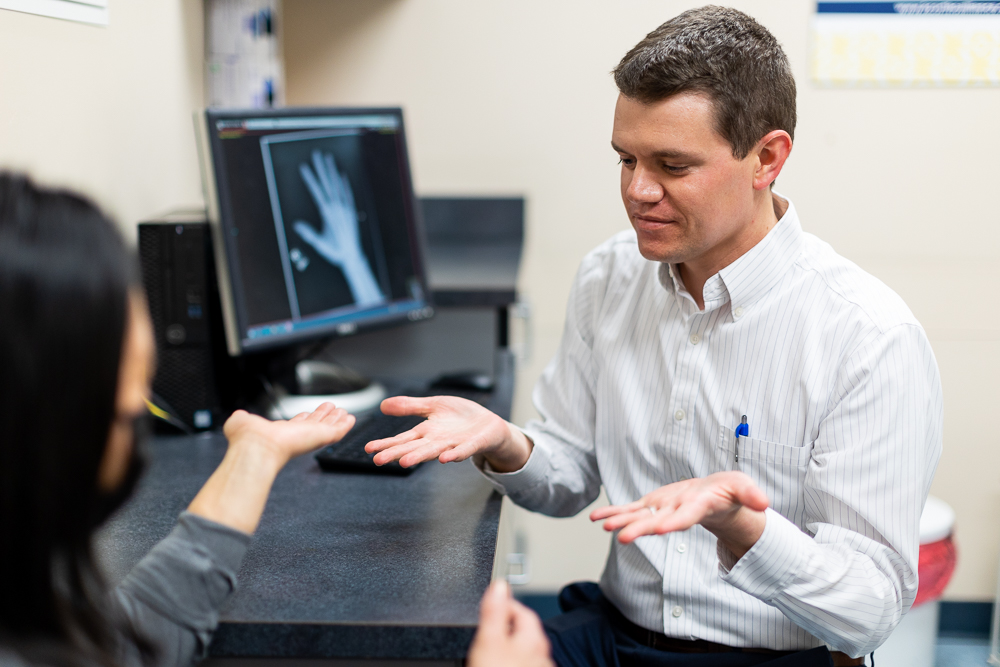
Particularly as people age, our joints are subject to consistent wear and tear that takes its toll over time. Even normal activities like running, going up and down stairs, squatting, or standing for long periods can contribute to joint degeneration and pain. When this happens, a joint replacement in Kansas City may be your best option to restore function and alleviate symptoms.
If you’re looking for long-term solutions to support your joint health, the experienced providers and surgeons at Kansas City Orthopedic Alliance are capable of delivering unmatched expertise and guidance.
Our team works with patients on an individual basis, considering their past health, individual challenges, needs, and long-term goals for care. We combine this information with years of experience to empower and educate our patients to make the best decision for themselves.
If you’re suffering from chronic pain or an acute injury to your knees, hips, shoulders, ankles, hands, or feet, read on to find out whether a total joint replacement in Kansas City may be the best option to treat your symptoms.
What is Joint Replacement Surgery?
Most commonly, joint problems develop because of a degenerative joint disease known as osteoarthritis. Osteoarthritis commonly occurs due to previous trauma or fracture. This can come in the form of a sports injury, vehicle crash, or just the gradual stress of everyday activities such as running, stair climbing, prolonged standing, and more. Other health issues, such as obesity, can exacerbate the issue by applying more pressure to the joints.
Osteoarthritis is characterized by diminished cartilage that causes the bones in your joints to rub together. When that cartilage is healthy, it acts as a cushion, protecting the bones from rubbing together. When that cartilage deteriorates, it can lead to painful symptoms such as inflammation, swelling, and stiffness. In more extreme cases, it can even lead to immobility.
There are certain factors that put people at a higher risk of osteoarthritis issues. These include:
- Age
- Genetics
- Physical Activity
- Joint trauma
- Obesity
Most people begin to see signs and symptoms of osteoarthritis when they reach their 50s. However, injuries and certain genetics can cause the onset of symptoms or the loss of function even earlier.
Total joint replacement in Kansas City is just one of the treatments offered at KCOA to alleviate osteoarthritis symptoms and restore function in the joints. With joint replacement surgery, your surgeon will remove parts of the damaged joint and replace it with a prosthetic implant.
Total joint replacement surgery is an invasive procedure and often the last resort when it comes to treatment options. Your provider and care team at KCOA will explore and exhaust all other avenues for treatment before recommending a total joint replacement. Your provider will recommend this treatment only after it’s abundantly clear that joint replacement surgery is the best option for restoring function and alleviating symptoms.
Conservative Measures
It’s our duty as medical providers to do no harm. When joint pain brings you to KCOA, we’ll do our best to treat your pain or function loss using conservative measures characterized by therapeutic treatments and services.
The providers at KCOA will work with you to explore all conservative measures for the treatment of joint pain before recommending a more invasive procedure. When looking at conservative treatments, the providers at KCOA often take a multimodal approach. This means that patients may use one or a combination of our most common conservative treatments, including the following:
- Activity modification
- Stretching
- Physical Therapy
- Bracing
- Yoga
- Referral to a dietician
- Medication
- Injections
- And more
When it comes to osteoarthritis in the shoulders, elbows, and ankles, most patients don’t need a surgical procedure. Generally, pain management techniques and conservative measures like those listed above are enough to treat the issue.
Where many people require surgery or physician intervention is when joint issues affect mobility. The inability to walk normally, stay active, or maintain a healthy weight because of osteoarthritis in the hips and knees is an indicator that surgery may be necessary.
Ultimately, the treatments utilized by KCOA will be a collaborative decision made by both you and your provider. An initial consultation where we take into account your past medical history, current medications, challenges, and goals will allow our team to provide the best possible recommendation. If patients see significant progress in their symptoms and joint functionality using these treatments, we’ll likely avoid an invasive joint replacement in Kansas City.
In addition to treatments, patients themselves can also utilize conservative measures in their daily life. One of the best things that patients can do to help themselves is to eat healthier. Particularly in our lower body joints, carrying excess weight can put enormous pressure on our bodies and cause the cartilage to deteriorate. Quitting smoking is also highly effective, as smoking causes stress to the body’s connective tissue.
Additionally, our providers recommend finding a proper balance between active rest and movement. Stretching and performing lighter daily activities allow your joints the benefit of going through their full range of motion. However, strenuous activities can cause additional wear and tear on your joints and put you at risk for an acute injury. These include activities such as running, jumping, and high-impact aerobics. Choosing activities that build muscle without damaging the joints themselves is crucial.
Your Total Joint Replacement in Kansas City
If a joint replacement in Kansas City is your best option for treatment, there are a few things you should expect. Your surgeon and care team will go over all of the details during your appointments leading up to surgery. Your team will also provide you with instructions regarding check-in time, medications, and a pre-admission clinic appointment if necessary. Patients will also need to contact their insurance provider to ensure that they have coverage for the prescribed procedure.
Your care team will also provide you with a set of pre-procedure instructions that you’ll be expected to follow. Though the instructions will vary based on the patient’s specific needs, you can expect to not eat or drink after midnight the night before surgery. This includes gum and chewing tobacco as well. You’ll also need to stop taking certain medications in the days leading up to surgery. For a full list, please contact your KCOA care team.
A joint replacement in Kansas City is an invasive procedure, but one that is relatively common. For your surgery, we will put patients under anesthesia and generally complete the procedure in approximately two hours. With any joint replacement, it’s important to remember that your procedure is not a “quick fix” and that recovery will take time. Many of our patients go home the same day following their procedure. If necessary, most hospital stays are 2 days or less.
Following your surgery, you’ll receive a set of recovery instructions that you’ll need to follow closely in order to ensure optimal results. No two recovery processes are the same, and various factors such as age, the type of procedure, your activity level, and more will impact how long it takes to return to normal activities.
We will remind you that listening to your provider, treatment team and your body is essential to get the best results following surgery. You will need rest, nutrition, pain management, and guided exercise to improve mobility, strength, and function.
Prosthetic Implants
With any joint replacement procedure, your surgeon will remove parts of the affected joint and replace it with a prosthetic implant. These artificial prostheses mimic your body’s natural design, allowing the joint to achieve normal range of motion and helping patients to resume their normal activities.
They’re also made with a variety of different materials, including metal, plastics, and ceramics. The material and geometric shape of the implant used for the procedure will depend on the individual needs of the patient.
Most implants used during a total joint replacement in Kansas City last a minimum of 15 to 20 years.
Ultimately, your surgeon will provide you with a recommendation for the type of prosthesis used. All decisions made at KCOA are done collaboratively between the patient and their care team in order to provide the best possible experience.
Have Questions About Treatments & Total Joint Replacement in Kansas City? Contact Kansas City Orthopedic Alliance Today!
At Kansas City Orthopedic Alliance, we’re dedicated to creating a superior patient experience for all. If you’re considering joint replacement surgery in Kansas City to treat pain and discomfort and restore function, our team will work with you to ensure the best possible outcomes.
Scheduling an appointment with one of our providers allows us to find the best treatment option for your needs. Using the highest quality technology, we can pinpoint the exact underlying issue causing your joint pain or discomfort.
For a thorough evaluation, call us at (913) 319-7600 or schedule an appointment today. You can also use our symptom tracker tool if you’re struggling with pain and looking for proper treatment recommendations.


